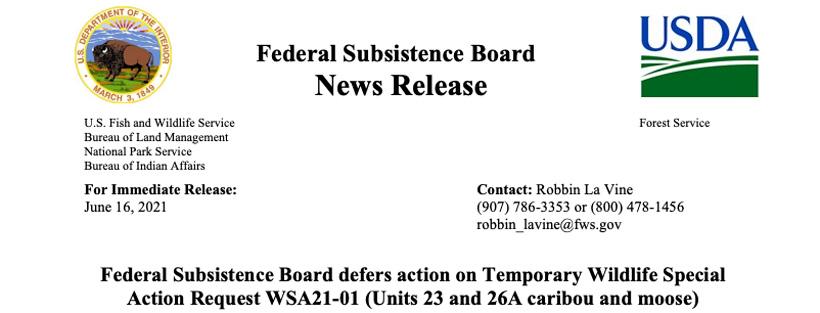




Screenshot of the press release.
On June 16, 2021, the Federal Subsistence Board deferred action on Temporary Wildlife Special Action Request WSA21-01. This special action would have blocked access to Alaska game management units 23 and 26A for not only nonresident hunters, but all non-federally qualified users. A federally qualified user is classified as someone who is essentially a subsistence hunter. Specifically, the Department of the Interior defines a federally qualified user as follows: “Only residents of communities or areas that the Board has determined to be rural are eligible for the subsistence priority. You must have your primary, permanent place of residence in a rural area to qualify to hunt, trap, or fish under Federal subsistence regulations.” See the first article we covered on this proposal here.
Originally submitted by the Northwest Arctic Subsistence Regional Advisory Council, this closure would have been primarily a closure for caribou and moose hunting from Aug. 1 to Sept. 30, 2021.
This deferral of action is not the end of the special action request. According to a press release by the Department of the Interior “The Board requested that Office of Subsistence Management additional input on concerns related to caribou from the Western Arctic Caribou Herd Working Group, Federal land-management agencies, local Fish and Game Advisory Committees, the Alaska Department of Fish and Game, Regional Advisory Councils, commercial guides and transporters, and subsistence users.” The argument could be made that this additional input was brought forth during the public comment section in subsequent comment periods and during other meetings in which the public was allowed to voice opinions.
Any action on the closure of these hunt units has been delayed until 2022. The viewpoints presented by both sides of the argument are very real concerns. Each and every year people worry about migrating herds allowing them to fill their freezers to feed their families and each and every year guides rely upon out-of-state hunters as a means of income so that they might also feed their families. This situation must be viewed with a sense of judiciousness that comes with the forethought of the North American Model of Wildlife Conservation. Perhaps the best decision is not going to make most people happy right now, but it might ensure that a wild place is available for others to enjoy for years to come. The fact of the matter is that further thought and consideration must be given to this delicate situation.
As of right now, no rules for these areas have changed for the upcoming 2021 season. GOHUNT will continue to monitor and report on this evolving situation.